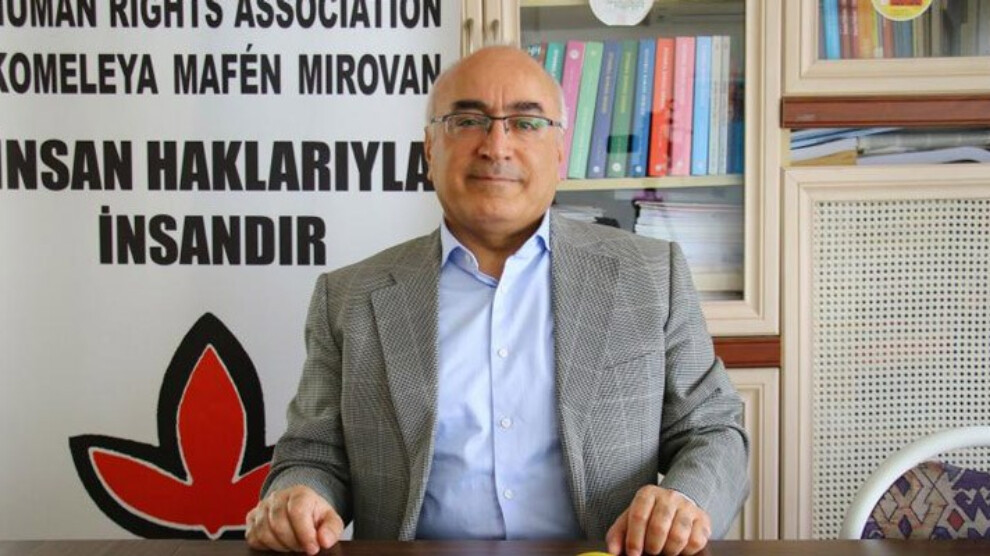Türkdoğan: There are 1,600 ill prisoners in jails
Pointing out that the number of ill prisoners has reached 1,600 (it was 17 in 2007), IHD co-chair Öztürk Türkdoğan said: "The way to object to the system is through Imralı."
Pointing out that the number of ill prisoners has reached 1,600 (it was 17 in 2007), IHD co-chair Öztürk Türkdoğan said: "The way to object to the system is through Imralı."

Violations of rights in prisons have recently reached dimensions that threaten the fundamental right to life. According to the data published on the official website of the Ministry of Justice, General Directorate of Prisons, as of 1 December 2022, 336,315 people are being held in penal institutions well over the full capacity of 286,797. In fact, there are an extra 49,515 detainees in prisons. According to the Human Rights Association (IHD), the number of ill prisoners rose to 1,600. In one year, 76 detainees died in prisons, and many more died shortly after a late release.
IHD co-chair Öztürk Türkdoğan evaluated the extent of violations of rights in prisons, the possible solutions and the effects of the deepening isolation on Imralı Island.
17 ill prisoners in 2007, 1,600 in 2022
Türkdoğan emphasized that many health rights are violated as prisoners are being held in a closed and overcrowded environment. “As far as we could determine, in 2007, the number of ill prisoners was 17. In 2022, this number has reached 1,600. And we estimate that the real number is 3-4 times the number we were able to detect.”
At least 70 prisoners died in 2022
Stating that the number of detainees who lost their lives in 2022 exceeded 70 as far as could be determined, Türkdoğan said that violations of the right to health directly affect the violation of the right to life. He recalled the Ministry of Justice's statement in August, and said: “The Minister stated that they would make a law change that would solve the issue of medical examination in handcuffs and ensure the release of ill prisoners. We expect the necessary steps to be taken as soon as possible so that more people do not lose their lives."
Isolation in Imrali spread to other prisons
Türkdoğan said that the isolation practices implemented in Imralı Prison spread to all jails in the country and added: “Before the Imralı prison was established, the authorities carried out a trial in the early 90s. But this trial was abandoned as a result of the resistance carried out by the prisoners. This process started again in Imralı in 99. In the 2000s, F-type prisons were introduced and this system was further expanded. New 'high security' prisons were built."
Emphasizing the need to oppose isolation, Türkdoğan said: “If we do not object to the strict isolation imposed on Abdullah Öcalan because of his political identity, if we remain silent, this violation will continue to spread. If there are laws in this country, they should be enforced for everyone. If you don't like the law, it should also be appealed. We demand that the laws be changed. If there is a place called Imralı prison in this country, if Abdullah Öcalan and other prisoners are kept there, why are they not allowed to be visited by their families and lawyers? This paves the way for arbitrary practices.”
The opposition should be worried
Emphasizing that the opposition in Turkey also adopts a discriminatory attitude, Türkdoğan said that above all, a humanitarian approach should be adopted when it comes to human rights and the rights of prisoners. “Let's assume that a CHP deputy is imprisoned and is not allowed to see anyone for a month. Hell will break loose in this country. Yet, it has not been possible to communicate with 4 citizens of this country for almost 2 years. Why are the opposition not worried about this situation? The isolation may seem like it is applied to a limited area, but it should be underlined how widespread the effects of this application are. At this point, with the high-type prison model, people will be taken to a room alone and will be deprived of many rights. This is where the system comes in. The way to object to this is through Imralı. First of all, it is necessary to adopt a human approach.”